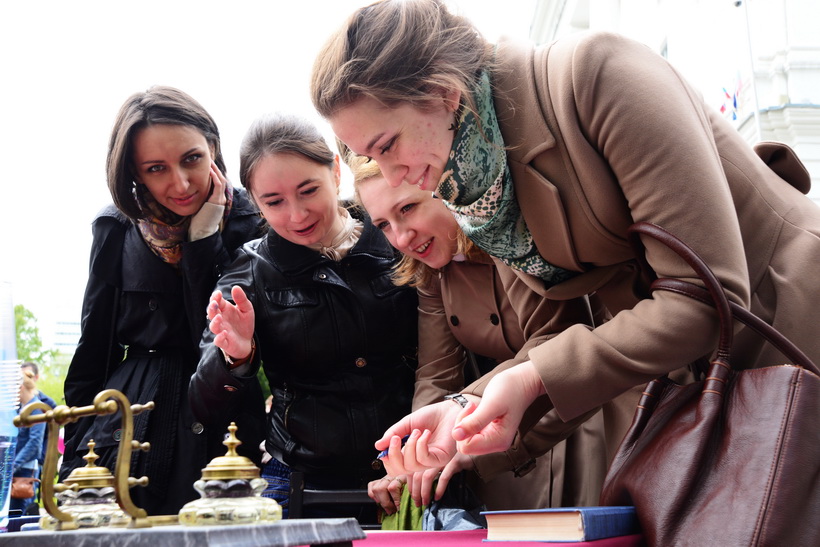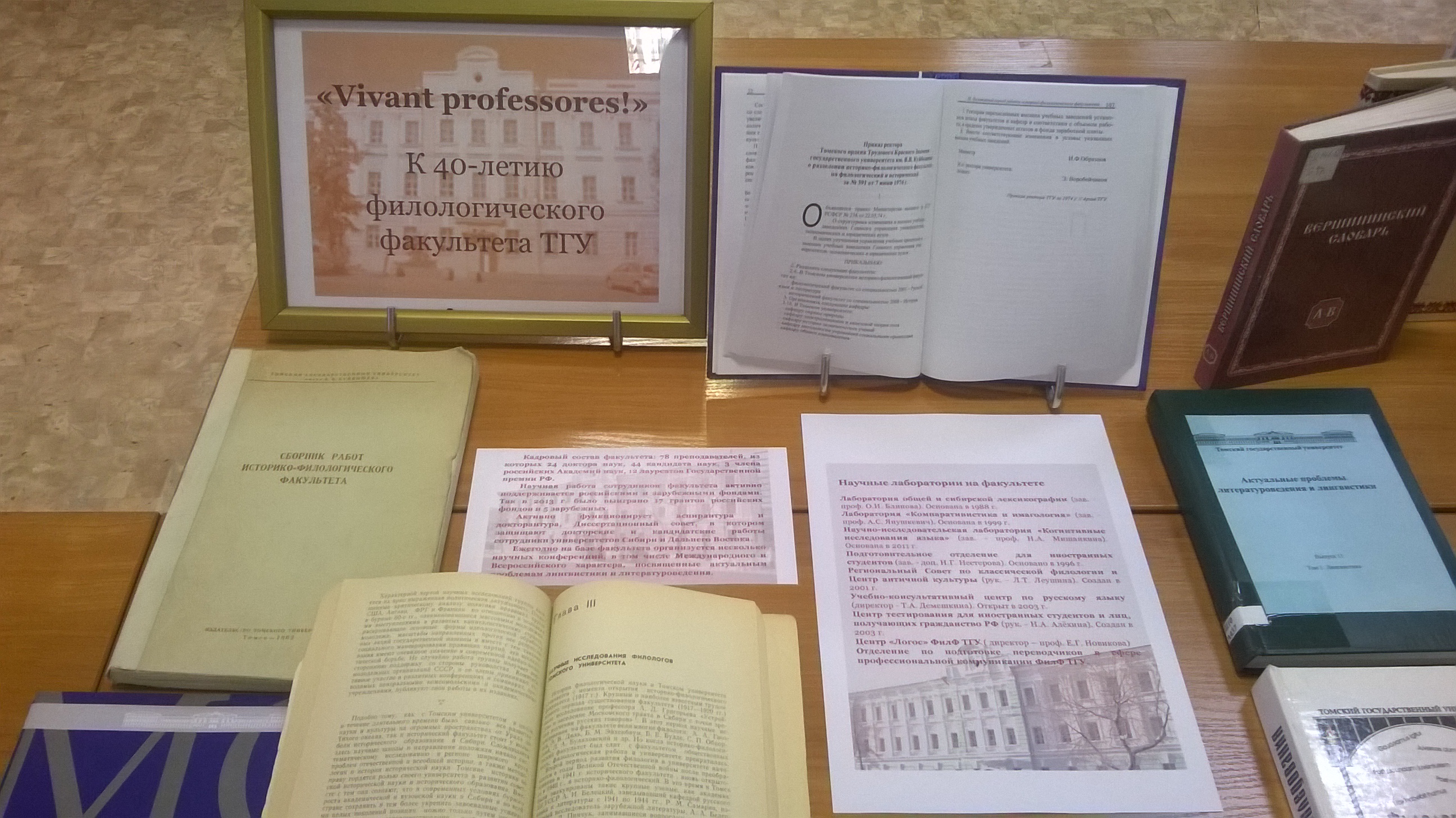The History of the Philological Faculty
The Philological Faculty is one of the oldest in Tomsk State University. It was founded in 1917 as the Faculty of History and Philology and included three departments: Historical, Philosophical and Philological. In 1974 the Philological Department acquired the status of an independent faculty with several departments, among which there were the Departments of the Russian Language, the Department of General Slavonic-Russian Linguistics and Classical Philology, the Department of Russian and Foreign Literature, the Department of the 20th century Russian Literature History, and the Department of Journalism. The Department of Romance and Germanic Philology was opened in 1994. In 2000, the Faculty established the Department of General Literature Studies that was later renamed as the Department of General Literature Studies, Publishing, and Editing. In 2004, the Department of Journalism became an independent faculty.
Nowadays the Philological Faculty takes part in TSU innovation programme, develops innovation educational techniques and applies the advantages of classical education to modern needs in different spheres of life.
We are proud of our worldly recognized academic staff who ensure a high level of education.
Among us are:
- 24 Doctors of Science
- 44 Candidates of Science (Russian analog of Ph.D.)
- 3 Members of the Russian Academy of Science
- 12 Laureates of the Russian Federation State Award
The Faculty consists of six Departments, the Regional Methodical Council for Classic Philology, the Center of Antique Culture, the Laboratory of General and Siberian Lexicography Research, the Scientific–Educational Laboratory of Cognitive Technologies in Applied Linguistic.
Here is the Curriculum of our 45.04.01 Russian as a Foreign Language and basic educational program
We also have the Testing Center in Russian for Foreign Citizens.
The Structure of the Philological Faculty
Department of the Russian Language
The Department of the Russian Language is focused on fundamental research and applied knowledge integrated with the educational process. The Department has scientific potential on the highest level. Scientific activity has always been the Department's priority.
The Department successfully develops such new branches of philology as:
- Juridical Linguistics
- Cultural Linguistics
- Cognitive Linguistics
- Sociolinguistics
- Ontolinguistics
The Department professors lecture the extension courses for professors of TSU.
The most popular programmes of the Department are "Linguistics at the turn of the century", " Russian as a foreign language", "The Russian language and the Standards of Speech". The Department organizes some conferences and seminars, including:
- "Topical Problems of Russian Philology: Linguistic Aspects of Regional Human Existence" (2003)
- The Linguistic Readings in the name of Professor V. Palagina (2003)
- “V. Dal and the 20th-century Lexicography” (2001)
The department is headed by Professor Tatyana Demeshkina, Doctor of Philology.
Department of General Slavonic-Russian Linguistics and Classical Philology
Founded in 1974, the Department embodies the best features of a classical university department and continues traditions introduced by Professors E.V. Dil, B.L. Bogaevsky, P.I. Kagan, A.L. Pinchuck and E.F. Molina.
The department is headed by Professor Zoya Rezanova, Doctor of Philology.
The main fields of study:
- Cognitive linguistic research (problems of linguistic world-modelling, conceptual metaphor theory, cognitive theory of derivation, and experimental psycholinguistic)
- Sociolinguistic and discursive research (scientific, political, media, folklore, and everyday discourses). Perception of text and discourse from the perspective of the recipient. Modeling and manipulative aspects of the discourse
- Literary stylistics
- Comparative Linguistic
- Classical Philology
Department of Russian and Foreign Literature
The Department was opened in 1957 and was long headed by F.Z. Kanunova, Doctor of Philology, the founder of Tomsk School of Zhukovsky Heritage Studies.
The main research directions are:
- Russian Literature textology
- poetics of Ancient Russian, Classical and Russian Literature
- Russian Literature in the socio-cultural context
- comparative and translation studies (Russian-English, Russian-German, and Russian-Italian literature contacts).
Department of 20th Century Russian Literature History
The Department was formerly known as the Department of Soviet Literature (1957) and the Department of Theory of Literature and the XX century Russian Literature (1993).
Among the scientific events initiated and organized by the Department were the All-Russian Conference “Philology and Philosophy in Contemporary Cultural Space” and International Internet-Conference “The Problems of Development of the Russian Language Literature and the Destiny of East-Slavonic Cultural Society”.
The department is headed by Professor Vyacheslav Sukhanov, Doctor of Philology.
Department of General Literature Studies, Publishing and Editing
In 2000, the Department of the Theory of Literature and Russian Literature of the 20th century was reorganized to form the Department of General Literature Studies, which later became the Department of General LiteratureStudies, Publishing, and Editing.
The curriculum includes such courses as Theory of Literature, History of Literary Criticism, Introduction toLiterature Studies, Folklore, Theory and Methods of Literature Teaching.
The Department is headed by Professor Irina Ayzikova, Doctor of Philology.
Department of Romance and Germanic Philology
The Department enrolled first students in 1994. The first head of the department was the TSU graduate Associate Professor Natalia Vetsheva who succeeded to integrate the long-standing experience and research potential of the Philological Department with professionalism of Tomsk State Pedagogical University graduates who came to teach foreign languages.
At present the students of the Department major in Professional Communication in Foreign Languages (English, German and French).
The Department is headed by Associate Professor Darya Olitskaya, Ph.D. in Philology.
DEGREE PROGRAMMES
Bachelor Programmes
PHILOLOGY
1. Russian Philology
Form of study: Daytime
Degree: Bachelor
Language: Russian, English
Admission requirements: document of previous education
Entrance examinations:
- Russian Literature (major)
- Russian Language
- History of Russia
Length of study: 4 years
-
Curriculum 45.03.01 Russian Philology (Russian Language and Literary) and basic educational program
-
Curriculum 45.03.01 Russian Language and basic educational program
-
Curriculum 45.04.01 Russian Literature and its European Connections and basic educational program
Here the list of the basic documentation:
-
Curriculum Vitae of the teaching staff carrying out the cluster of the study programs
-
Report on self-evaluation of the cluster of the study programs in subject areas 45.03.01, 45.04.01
- Information on equipped study rooms, facilities for practical classes
2. Professional Communication in Foreign Languages
Form of study: Daytime
Degree: Bachelor
Language: Russian, English, German, French
Admission requirements: document of previous education
Entrance examinations:
- Russian Literature (major)
- Russian Language
- History of Russia
- English Language (entrance test)
Length of study: 4 years
-
Curriculum 45.03.01 Professional Communication in Foreign Languages (English and German) and basic educational program
-
Curriculum 45.04.01 Text Technologies: Creation and Translation and basic educational program
BOOK PUBLISHING
Form of study: Daytime
Degree: Bachelor
Language: Russian, English
Admission requirements: document of previous education
Entrance examinations:
- Social Studies (major)
- Russian Language
- Russian Literature
Length of study: 4 years
Here the list of the basic documentation:
FUNDAMENTAL AND APPLIED LINGUISTICS
Form of study: Daytime
Degree: Bachelor
Language: Russian
Admission requirements: document of previous education
Entrance examinations:
- Foreign Language (major)
- Russian Language
- Mathematics
Length of study: 4 years
LITERARY WORK
Form of study: Daytime
Level: Specialist
Language: Russian
Admission requirements: document of previous education
Entrance examinations:
- Russian Literature (major)
- Russian Language
- Creativity competition
Length of study: 4 years


